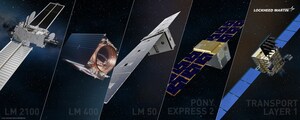SYRACUSE, N.Y., April 10, 2018 /PRNewswire/ -- Lockheed Martin (NYSE: LMT) and Cobham (LSE: COB) are joining forces for the Next Generation Jammer Low Band (NGJ-LB) competition to replace the U.S. Navy's ALQ-99 tactical jamming system currently on the E/A-18 Growler aircraft.
"The Lockheed Martin and Cobham team will leverage expertise in both companies to offer the U.S. Navy a critically important system with increased capability and reduced risk," said Joe Ottaviano, director of electronic warfare at Lockheed Martin. "Our team is confident we can meet the Navy's need for improved jamming capabilities with a scalable, open architecture design that balances capabilities with size, weight and power constraints."
Both partners on the team bring critical capabilities and areas of expertise. Cobham developed and was the only production partner to the U.S. Navy for the ALQ-99 Low Band Transmitter/Antenna Group (LBT/AG) and has been supporting the LBT/AG program for more than 20 years. Lockheed Martin has been developing electronic warfare solutions for more than 40 years and has experience with various airborne and naval electronic warfare programs, including the Advanced Off-Board Electronic Warfare (AOEW) system and the multi-mission AN/ALQ-210 and AN/ALQ-217 Electronic Support Measures (ESM) systems for the U.S. Navy. These Lockheed Martin products provide situational awareness, threat warning and proven electronic warfare solutions to detect, track and deter incoming threats.
"Cobham has continued to invest in state-of-the-art, next generation Airborne Electronic Attack (AEA) transmitter capabilities for the EA-18G community and looks forward to continuing to deliver reliable and scalable solutions well into the future," said Jim Barber, senior vice president of Cobham Integrated Electronic Solutions, a business unit of Cobham Advanced Electronic Solutions. "Our strong partnership with Lockheed Martin on programs such as AOEW and the Surface Electronic Warfare Improvement Program (SEWIP) Block 2, along with our collective capabilities and heritage with the electronic warfare community will provide the best value for the U.S. Navy."
The NGJ-LB system will be integrated on the EA-18G aircraft and will replace the ALQ-99 low band pods. The ALQ-99 is a tactical jamming system that has been deployed on the EA-6B Prowler and now the EA-18G Growler. The NGJ-LB system will provide significantly greater electronic attack capabilities in the lower frequency bands of the electromagnetic spectrum against modern threats.
Cobham is the only company to continuously provide ALQ-99 Airborne Electronic Attack transmitters to the U.S. Navy since the initial operational deployment of the EA-6B in 1972, delivering over 850 transmitters. Since that time, Cobham has invested in cutting edge Gallium Nitride (GaN) power amplifier and antenna technology to ensure that the Navy's high performance, reliability, and sustainability needs are met. Cobham's latest ALQ-99 Low Band Transmitter has provided critical protection for U.S. and coalition warfighters since 2005.
For more information, visit www.lockheedmartin.com/electronicwarfare and www.cobham.com/ew
About Lockheed Martin
Headquartered in Bethesda, Maryland, Lockheed Martin is a global security and aerospace company that employs approximately 100,000 people worldwide and is principally engaged in the research, design, development, manufacture, integration and sustainment of advanced technology systems, products and services.
About Cobham Advanced Electronic Solutions
We provide critical solutions for communication on land, at sea, and in the air and space, by moving data through off-the-shelf and customized products and subsystems including RF, microwave, and high reliability microelectronics, antenna apertures and motion control solutions. Cobham Advanced Electronic Solutions supplies defense, aerospace, security, medical, and industrial markets.
SOURCE Lockheed Martin
Related Links
WANT YOUR COMPANY'S NEWS FEATURED ON PRNEWSWIRE.COM?
Newsrooms &
Influencers
Digital Media
Outlets
Journalists
Opted In






Share this article